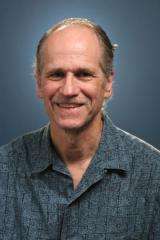Book by UC Riverside biologist explains Darwin's 'Origin of Species'

Many people have tried to read Charles Darwin's "Origin of Species," whose publication celebrates its 150th anniversary this month, but gave up.
For them and others who would like to know what the book is about, help by way of a new book is at hand.
World-renowned evolutionary biologist David Reznick is the author of "The Origin Then and Now: An Interpretive Guide to the Origin of Species" (Princeton University Press, 2009), which makes Darwin's book (hereafter "the Origin") more accessible by explaining its historical context, and converting it into more modern terms. Reznick's book also explains the immediate and longer term impacts of the Origin.
"I have taught the Origin to more than a dozen classes, and felt that I had figured out why Darwin's arguments were so hard to follow," said Reznick, a professor of biology at the University of California, Riverside. "His Victorian prose is a small part of the problem. The bigger part is that the book is rooted in the knowledge of science in 1859, which is quite different from today. To understand the book, it helps a great deal to understand the context in which the book was written and the audience that Darwin was addressing."
In his book, Reznick weaves in material from not only Darwin's earlier work, but also his monographs on barnacles. He also includes biographical material and brief descriptions of some of the mentors and contemporaries who helped shape Darwin's ideas, and who may have come into conflict with Darwin after the appearance of the Origin.
"To the best of my knowledge, no other book combines an explanation of the Origin with a definition of the historical context and of the differences in the way Darwin defined evolution and how we define it today," Reznick said.
Reznick hopes his book will expand the general public's knowledge of both Darwin and evolution.
"Anyone who reads my book will get more than an explanation of the Origin," he said. "They will also get a sense of the growth of an idea and how science works."
Reznick's background research for writing the book was a product of his teaching and his hobby of reading works by Darwin, his contemporaries, his biographies, and books about the history of science. Painstakingly, he also read the original literature that followed the Origin, from 1860-1918, then the modern synthesis classics that appeared in the 1930s and later.
"I also followed Darwin's lead of making heavy use of correspondence," Reznick said. "He was famous for writing letters and seeking input from experts all over the world by making best use of the efficient Victorian postage network. I used the Internet."
Source: University of California - Riverside (news : web)

















